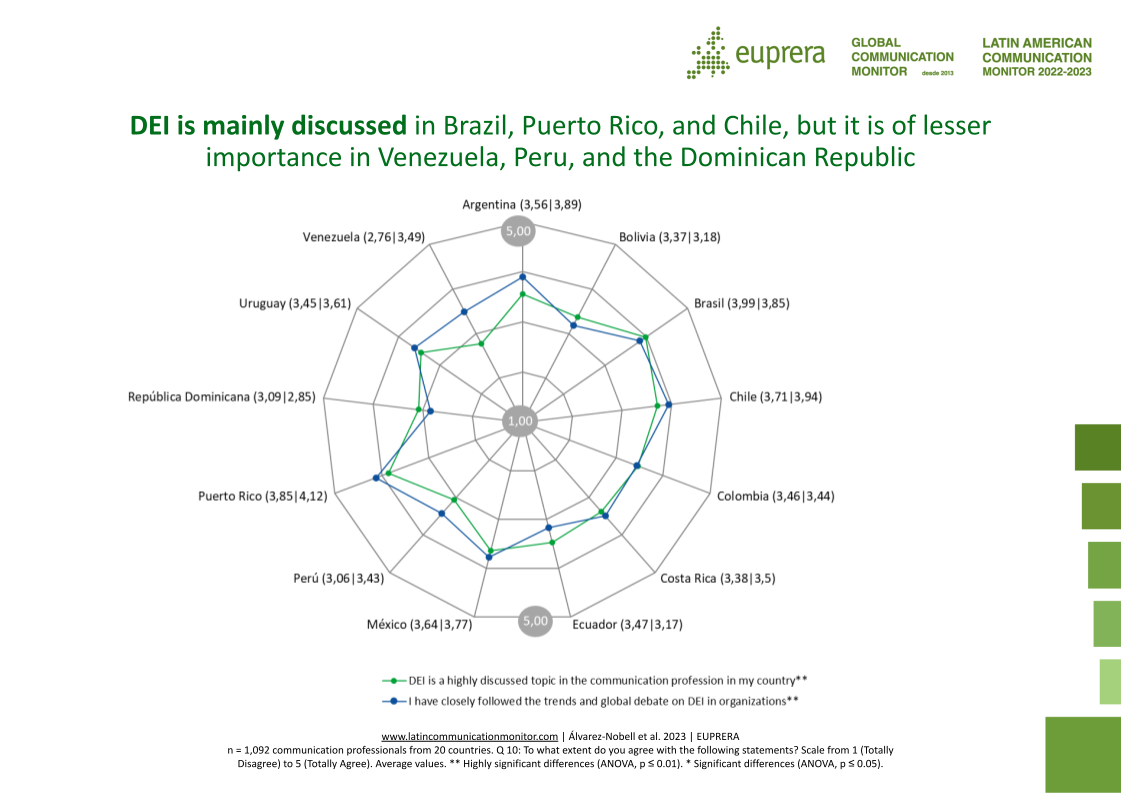Only 20% of professionals in strategic communication and public relations in Latin America consider policies on Diversity, Equity, and Inclusion (DEI) as a future priority
The 2022-2023 edition of LCM explores the landscape of Diversity, Equity, and Inclusion (DEI) in Communication in Latin America

The global context, marked by events such as #8M, #InternationalWomensDay, and UN Sustainable Development Goal No. 5 on «Gender Equality», has sparked deep reflection in the field of strategic communication and public relations. Global initiatives like EUPRERA’s #WomenInPR, regional projects like #AcademicasPR, and national projects like Argentina’s «Glass Ceiling and Public Relations: Transdisciplinary Approaches in Social Sciences in Addressing Gender Issues» demonstrate a growing commitment to gender equity in the professional field.
Academic literature has also seen significant growth, as reflected in the monograph «Women in Public Relations». Recent studies, such as those by Guerrero Navarro & Ruiz-Mora (2022) and «LidGenCom» by Moreno et al. (2023), have examined female leadership in Spain, highlighting challenges such as the need for more inclusive communication styles and persistent discrimination in predominantly male work environments. These analyses underscore the importance of addressing existing barriers and promoting gender equity throughout the Latin American region.
The Latin American Communication Monitor (LCM) has been a key observer of these trends, particularly regarding Diversity, Equity, and Inclusion (DEI), as evidenced in its special 2021 report on the «Glass Ceiling«. Furthermore, the highlighted results of its latest edition (2022-2023), in which the majority were women (63%), continue to shed light on several significant aspects:
- Active participation, low priority. Despite DEI capturing the attention of 50% of surveyed professionals, only 20% consider it a key strategic priority for the next three years. This finding highlights a gap between awareness of the importance of DEI and its effective integration into long-term strategy.
- The discussion on DEI varies in intensity. It is more relevant and consequently receives more attention from executive positions (6 out of 10). Geographically, the debate is more prominent in countries like Brazil, Puerto Rico, and Chile, while it is less important in Venezuela, Peru, and the Dominican Republic.

- The private sector is leading the discussion. Publicly traded companies, as well as consulting firms and agencies, pay more attention to DEI-related discussions compared to the public sector, where the discussion is less frequent.
- Trust and coherence: two fundamental pillars. Over 80% of professionals emphasize the importance of coherence between speech and practice, considering it crucial for maintaining the trust of internal and external stakeholders.
- Interdepartmental synergy. Although only 36% point to communication departments as the main responsible for DEI initiatives, an encouraging 62% collaborate with other departments, especially human resources.
- Evaluation and development of plans. Evaluation and refinement of DEI plans and content are considered the top responsibility by 48% of respondents, closely followed by 47% dedicated to the development of communication plans.
- Factors impacting perceptions. The study highlights how differences in gender, age, socioeconomic status, and political opinions impact perceptions of DEI in various organizations, underscoring the need for specific and adaptive strategies.
The results reveal that despite active participation in debates on Diversity, Equity, and Inclusion, there is a gap between awareness and strategic prioritization. The importance of interdepartmental collaboration, authenticity in DEI actions, and adaptability to varied perceptions highlight the path toward more inclusive and equitable organizations in the Latin American region.
Join the conversation and be part of the change towards more inclusive and equitable communication in Latin America!
The LCM is part of the Global Communication Monitor, driven by the European Public Relations Education and Research Association (EUPRERA), which, in 16 years, has surveyed approximately 50,000 professionals in more than 80 countries. In addition to the Latin American region, the study is complemented by chapters in Europe (ECM), Asia-Pacific (APCM), and North America (NACM). The 2022-2023 edition of the LCM is sponsored by the Central American Bank for Economic Integration (BCIE), the Institute of Public Relations (IPR), the University of Oregon (United States), and the Creative Campus of the Latin University of Costa Rica. Additionally, it receives academic support from the Regeneration, Well-being, and Positive Communication Research Group ReBiCom UMA Network at the University of Malaga (Spain); the Advanced Communication Studies Group at the University Rey Juan Carlos (Spain); the Research Group in Communication Studies (GRECO) at the University of Medellin (Colombia), and the Latin American Network for Research in Organizational Communication (RedLAco).


















